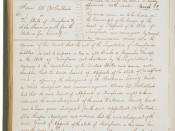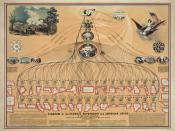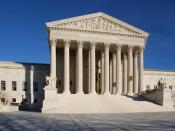One well used definition of politics is "who gets what, when, and where." That briefly describes the development of federalism as well. In this case, the "what" is power, the "where" is every where, and the "who" is the question that has been answered by years of development. The single most important factor in determining what exactly "who" means for modern American federalism was (and is) the Supreme Court.
The seeds of federalism were sown by King George VI in England. The Colonists were being oppressed by their government, so naturally when they seceded from Britain, they were sure to put a government that could not restrict their rights as Englishmen. This came in the form of the Articles of Confederation. The differences in the colonies created some dichotomizing differences in government and policies, so the Federal Government was limited, but this was the first step towards a unity that wasn?t unnecessarily oppressive.
In 1787, The constitution was signed and implemented. If there is a single most important event for federalism, this is it. The constitution was a document, written after that philosophy of John Locke, that guaranteed certain rights to all people very explicitly. The constitution gives power to both the states and the National Government, and at the time gave the states more power over themselves than they have now. In 1803 the Supreme Court case of Maybury vs. Madison, a ruling was made that helped established federal supremacy over the states. When the National Government implemented a national bank, the state of Maryland taxed the bank heavily in hopes of destroying it. In the ruling of McCulloch Vs. Maryland, the Supreme Court ruled that the Federal Government had supremacy over the states. Two more important principles also came from this ruling; the governments had certain enumerated powers...



Nice one
Good but short
0 out of 0 people found this comment useful.